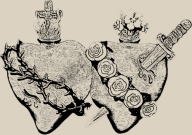Days of penance have come to us, that we may redeem our sins and save our souls.
What is Lent?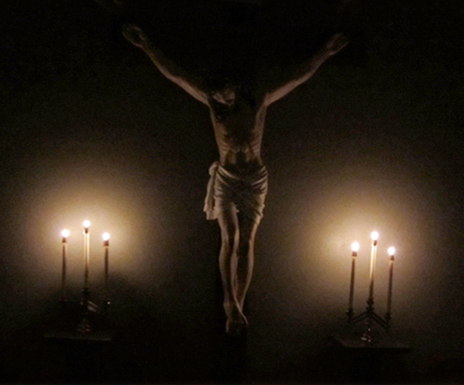
“The Lenten spirit and message are summed up in two doctrines, Christian penance and Christ’s Passion, which divide the entire forty days into two equal parts. During the first part of Lent, we are called on to do penance. The Lessons and Gospels show us the true spirit of penance. They teach the devout and contrite Christian how to fast and pray and give alms, all of these actions being enlivened by the spirit of mortification.
“Yet Lent taken as a whole is not concerned with my actions so far as they belong to me. It directs attention away from self. During Lent, we ought to be taken outside of ourselves. All the time, our gaze will be fixed on one supreme act, the Passion and Death of Our Lord. Our purpose is an understanding and appreciation of that. It is to Calvary that we are going, for it is there that we shall find the perfection of our own individual lives, and, at the end of our journey together, our ‘pains shall be turned into everlasting joy by the virtue of Christ’s passion’ (Mother Julian of Norwich, Revelations, c. 20), and we shall be able to cry triumphantly with St. Paul, ‘With Christ I am nailed to the Cross. And I live, now not I, but Christ lives in me.’
“Suffering, then, is the theme of Lent. Gradually, as the Church unfolds before our eyes the story of the Passion, we shall come to unite our own sufferings to His. Our eyes will be turned away from ourselves and our own small fasts and austerities. Instead of looking at ourselves, we shall look at Jesus, wounded and dying, hanging on the Cross for love of us.
The True Purpose of the Lenten Fast and Abstinence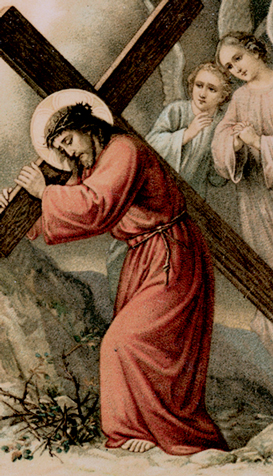
“...Such a fast is a great and all-embracing thing: to abstain from sin and lawless worldly lusts. For what genuine fasting implies is this: ‘that, rejecting ungodliness and worldly lusts, we may live temperately and justly and piously in this world.’ And what reward does the Apostle specify for such a fast? He states it immediately: ‘looking for the blessed hope and glorious coming of our blessed God and Savior Jesus Christ.’ In this world, then, we observe the forty-day fast when we live rightly, denying our inclinations to sin and sinful desires. And since this self-denial will not go unrewarded, we look forward to the blessed object of our hope, the appearance of the glory of Almighty God, Jesus Christ our Savior. Through that hope, we will, when hope attains its object, receive our reward.... In sorrow, therefore, we observe the forty days before the paschal feast, but with joy we celebrate the fifty days after Easter, as when a reward is received.” – St. Augustine, Bishop and Doctor (4th century), from the lessons of Matins, Ember Friday in Lent
“These mortifications have a twofold design, one positive, the other negative. As the knife of the surgeon cuts away the disease and restores health to the patient, so the sharp blade of asceticism removes the sins of the past, frees the body from the weight of concupiscence, and raises the mind to divine things. Penance helps to pay the debt of past sins for which we cry, ‘Spare, O Lord, spare Thy people.’
“By bodily fasting, our vices are restrained, our minds are lifted up, and we are given virtue and reward. So penance not only influences the present and future, but it also lessens the bad influences of the past. Mortification lessens that tendency toward sin arising from our frequent falls and so diminishes the likelihood of present and future sin. The eyes of the soul are thus turned from earthly to heavenly things. ‘Be converted to me with all your heart.... Rend your heart and not your garments, and turn to the Lord your God.’
“Lent is no call to a Stoical apathy, a cutting away of unnecessary material ties only to foster an individualistic independence, a gloomy tight-lipped asceticism, gaunt and pallid. The Stoic’s negative attitude to pain and suffering has often led people to judge the saints as forbidding, inhuman creatures whose only pleasure lies in strangling affection and wounding their flesh till it can scarce contain the soul. By misunderstanding Christian asceticism, some have come to cry, ‘Thou hast conquered, O pale Galilean; the world has grown gray from Thy breath.’ That is but an indictment of the Stoic apathy. The spirit of Lent is in direct opposition to this stark inhumanity. It is instinct with the breath of divine love; the fast and mortifications are but lowly means toward the raising of the mind to union with God, the most living and colorful reality that can be desired. Only by freeing himself from the chains that bind him to earth can the Christian hope to rise to the freedom of divine love and so dominate the material without destroying it. There is indeed a negative aspect to these self-inflicted sufferings. But it is evil or vice that is repressed; nothing wholesome or healthy is attacked. Penance is no more intelligible without the positive turning to God than is the destruction of burning coal without the glow and heat of the embers. This positive side, however, cannot be fully understood until it is viewed from the central movement of the whole of Lent which carries us eventually to the foot of the Cross on Good Friday. Then, purified from the contamination of modern individualism and rationalism, we shall perceive Lenten mortification not as the pointless gloom of the Stoics but as the losing of self and the finding of God.” – Rev. Father Conrad Pepler, O.P., Lent
Let us become better, we who have sinned through forgetfulness of God. Let us not wait for the day of death to start looking for time to repent; we may not find the time. – Esther 13
More can be read about fasting in our past newsletter.
What the Popes and Doctors of the Church Say
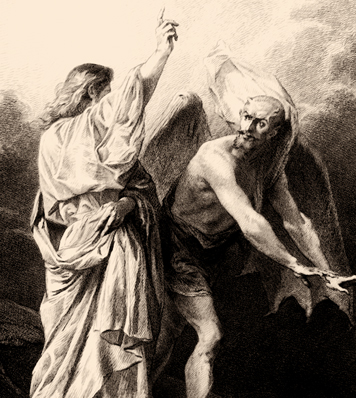 “The observance of Lent is the bond of union in our army; by it we are distinguished from the enemies of the Cross of Christ; by it we turn aside the chastisements of God’s wrath; by its means, being guarded by heavenly support during the day, we fortify ourselves against the prince of darkness. If this observance comes to be relaxed, it is to the detriment of God’s glory, to the dishonor of the Catholic religion and to the peril of souls, nor can it be doubted that such negligence will become a source of misfortune to nations, of disaster in public affairs and of adversity to individuals.” – Pope Benedict XIV, May 29, 1741
“The observance of Lent is the bond of union in our army; by it we are distinguished from the enemies of the Cross of Christ; by it we turn aside the chastisements of God’s wrath; by its means, being guarded by heavenly support during the day, we fortify ourselves against the prince of darkness. If this observance comes to be relaxed, it is to the detriment of God’s glory, to the dishonor of the Catholic religion and to the peril of souls, nor can it be doubted that such negligence will become a source of misfortune to nations, of disaster in public affairs and of adversity to individuals.” – Pope Benedict XIV, May 29, 1741
“At the commencement of...this, the greatest and most sacred of the fasts, what more fitting opening than to begin with the words of the Apostle, in whom Christ spoke, ‘Behold, now is the acceptable time; behold, now is the day of salvation’ (2 Cor. 6:2). For though there is no season that is not filled with the divine gifts, and though at each moment we have, through His grace, access to the Divine Mercy, yet now is the time in which the souls of all men should be stirred with greater fervor towards spiritual perfection and inspired with greater confidence; now, when the return of that day on which we were redeemed invites us once more to the fulfillment of all our sacred duties, so that, purified in body and soul, we may celebrate the supreme Mystery of the Passion of Our Lord. True, we ought always to be in the Divine Presence, just as much as on the Easter Feast. But since there are few that have this strength of soul, and since, because of the weakness of our flesh, a more severe observance may be relaxed, and also, since the manifold duties of the present life take up so much of our care, it will happen that even the most devout of heart are stained with the dust of earth.
“Accordingly, with great solicitude has this divine means been given us so that these forty days of reflection may assist us to restore the purity of our souls, making up, in a way, for the faults of the rest of the year by fasting and pious deeds. However, we must be careful to give no one the least cause of complaint or scandal so that our general behavior may not be inconsistent with our fasting and penance. For it is useless to reduce the nourishment of the body unless the soul departs from sin....
“Enter, then, with pious devotion upon these holy days of Lent and prepare for yourselves the works of mercy, that you may merit the Divine Mercy. Extinguish the fires of anger, wipe away all hate, love the bond of unity, give way to each other in the simplicity of true humility.... Let there be an end to vengeance. Let offences be forgiven. Let harshness be changed to mildness, disdain to gentleness, discord into peace. Let us all make trial of being modest, let all be gentle, all be kind, so that our fasting may be pleasing to God. To Him we shall offer a true sacrifice of self-denial and devotion if we keep ourselves from all iniquity, being helped in all things by Almighty God, Who with the Son and Holy Ghost is One in Divinity, One in Majesty, forever and ever. Amen.” – St. Leo, Pope and Doctor (5th century), Lent, the Season of Purification.
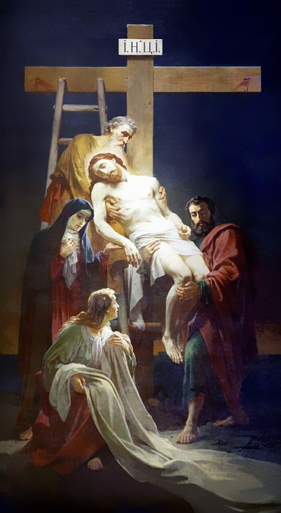 “Behold, Dearly Beloved, the sacred days are drawing near, the acceptable time.... And so you must be more earnest in prayer and in almsgiving, in fasting and in prayer. He that till now has given alms, in these days let him give more, for as water Our Lord's Crucifixion quenches a flaming fire, so does almsgiving wipe out sin (Ecces. 3:33). He that till now fasted and prayed, let him fast and pray still more, for there are certain sins which are not cast out, except by prayer and fasting (Mt. 17:20).
“Behold, Dearly Beloved, the sacred days are drawing near, the acceptable time.... And so you must be more earnest in prayer and in almsgiving, in fasting and in prayer. He that till now has given alms, in these days let him give more, for as water Our Lord's Crucifixion quenches a flaming fire, so does almsgiving wipe out sin (Ecces. 3:33). He that till now fasted and prayed, let him fast and pray still more, for there are certain sins which are not cast out, except by prayer and fasting (Mt. 17:20).
“Should anyone cherish anger towards another, let him forgive from his heart. Should anyone take unjustly what belongs to another, let him restore it.... And though a Christian should abstain at all times from cursings and revilings, from oaths, from excessive laughter and from idle words, he must do this especially in these holy days which are set apart so that, during these forty days, he may by penance wipe out the sins of the whole year.
“Let you believe and believe firmly that if in these days you have made a thorough confession of your sins and done penance as we have told you, you shall receive from Our Most Merciful Lord the pardon of all your offences.... If you cry out with all your heart to the Lord, you will invoke His Mercy on you, so that serene and joyful you will celebrate the day of the Lord’s Resurrection, and, thus blessed, you will after this life cross over to your heavenly home, by the grace of Our Lord Jesus Christ, Who with the Father and the Holy Ghost lives and reigns, world without end. Amen.” – St. Ambrose, Bishop and Doctor (4th century), The Acceptable Time, from Sermon for the First Sunday in Lent
“Our pilgrimage on earth cannot be exempt from trial. We progress by means of trial. No one knows himself except through trial, or receives a crown except after victory, or strives except against an enemy or temptations.
“The one who cries from the ends of the earth is in anguish but is not left on his own. Christ chose to foreshadow us, who are His body, by means of His Body, in which He has died, risen and ascended into heaven so that the members of His body may hope to follow where their Head has gone before.
“He made us one with Him when He chose to be tempted by Satan. We have heard in the Gospel (Mt. 4:1-11, First Sunday in Lent) how the Lord Jesus Christ was tempted by the devil in the wilderness. Certainly Christ was tempted by the devil. In Christ you were tempted, for Christ received His flesh from your nature but by His own power gained salvation for you; He suffered death in your nature but by His own power gained glory for you; therefore, He suffered temptation in your nature but by His own power gained victory for you.
 If in Christ we have been tempted, in Him we overcome the devil. Do you think only of Christ’s temptations and fail to think of His victory? See yourself as tempted in Him, and see yourself as victorious in Him. He could have kept the devil from Himself, but if He were not tempted, He could not teach you how to triumph over temptation.” – St. Augustine, Bishop and Doctor (4th century), Overcoming Temptation, from Sermon for the First Sunday in Lent
If in Christ we have been tempted, in Him we overcome the devil. Do you think only of Christ’s temptations and fail to think of His victory? See yourself as tempted in Him, and see yourself as victorious in Him. He could have kept the devil from Himself, but if He were not tempted, He could not teach you how to triumph over temptation.” – St. Augustine, Bishop and Doctor (4th century), Overcoming Temptation, from Sermon for the First Sunday in Lent
“Grant me, O Lord my God, a mind to know you, a heart to seek you, wisdom to find you, conduct pleasing to you, faithful perseverance in waiting for you, and a hope of finally embracing you.... Let me tear out the roots of vanity and live Lent as a Christian again....”– St. Thomas Aquinas (1225-1274)
Let us conduct ourselves in all circumstances in much patience…– 2 Corinthians 6
The Practices of Lent
Prayer
Fasting
Almsgiving
“We read in the book of Tobias that the Angel Raphael thus spoke: ‘Prayer is good with fasting and alms, more than to lay up treasures of gold.’ (Tob. 12:8) These three good works are the fruits of the virtues of religion, mercy and temperance, which have a great affinity with piety, justice and sobriety. For as piety regards God, justice our neighbor, and sobriety ourselves, so also prayer, which is an act of religion, regards God; almsgiving, which is an act of mercy, regards our neighbor; fasting, which is an act of abstinence, regards ourselves.” – St. Robert Bellarmine, Doctor of the Church (17th century), The Art of Dying Well
We ought always to pray and not to faint.... Watch ye, therefore, praying at all times. – St. Luke’s Gospel
 On the merit of prayer, we have the testimony of Christ Himself in the Gospel: ‘And when you pray, do not be as the hypocrites that love to stand and pray in the synagogues and corners of the streets that they may be seen by men. Amen, I say to you, they have received their reward. But you, when you pray, enter into your chamber, and having shut the doors, pray to your Father in secret, and your Father, Who sees in secret, will repay you.’ (Mt. 6:5-6) By these words, Our Lord does not forbid us to pray in a public place, for He Himself prayed publicly.... But He forbids public prayer when it is done so that we may be seen praying by many, and thus through vainglory.... [We must] find a ‘chamber’ for our heart, and in it pray to God ‘in secret’”. – St. Robert Bellarmine, Doctor of the Church (17th century), The Art of Dying Well
On the merit of prayer, we have the testimony of Christ Himself in the Gospel: ‘And when you pray, do not be as the hypocrites that love to stand and pray in the synagogues and corners of the streets that they may be seen by men. Amen, I say to you, they have received their reward. But you, when you pray, enter into your chamber, and having shut the doors, pray to your Father in secret, and your Father, Who sees in secret, will repay you.’ (Mt. 6:5-6) By these words, Our Lord does not forbid us to pray in a public place, for He Himself prayed publicly.... But He forbids public prayer when it is done so that we may be seen praying by many, and thus through vainglory.... [We must] find a ‘chamber’ for our heart, and in it pray to God ‘in secret’”. – St. Robert Bellarmine, Doctor of the Church (17th century), The Art of Dying Well
“When you fast, do not look gloomy like the hypocrites who disfigure their faces in order to appear to men as fasting. Amen, I say to you, they have received their reward. But you, when you fast, anoint your head and wash your face so that you may not be seen fasting by men but by your Father Who is in secret; and your Father, Who sees in secret, will reward you. Do not lay up for yourselves treasures on earth where rust and moth consume and where thieves break in and steal, but lay up for yourselves treasures in heaven where neither rust nor moth consumes nor thieves break in and steal. For where your treasure is, there also will your heart be.”– Gospel of St. Matthew, 6:16-21
“Give alms out of thy substance, and turn not away thy face from any poor person, for so it shall come to pass that the face of the Lord shall not be turned from thee...for alms deliver from all sin and from death and will not suffer the soul to go into darkness. Alms shall be a great confidence before the most high God to all them that give it.” – Tobias, 4: 7, 11-12
Be converted to Me with all your heart....
Scripture, Liturgical Prayers, Hymns and Meditations for Lent
Thou hast mercy upon all, O Lord, and hatest none of the things which Thou has made, overlooking the sins of men for the sake of repentance and sparing them because Thou art the Lord our God. (Wisdom 11:24, 25, 27) Have mercy on me, O God, have mercy on me, for my soul trusts in Thee. (Psalm 56:2) – Mass of Ash Wednesday
Thus says the Lord: Be converted to Me with all your heart, in fasting and in weeping and in mourning. And rend your hearts and not your garments, and turn to the Lord your God, for He is gracious and merciful, patient and rich in mercy, and ready to forgive evil.... (Joel 2: 12-14) – Mass of Ash Wednesday
Lord, repay us not according to the sins we have committed nor according to our iniquities. (Psalm 102:10) O Lord, remember not our past sins; let your mercy come quickly to us, for we are being brought very low. Help us, O God our Savior, and for the glory of Your Name, O Lord, deliver us; and pardon us our sins for Your Name’s sake. (Psalm 78:8-9) – Masses of Lent
Hymn for Matins in Lent
(“Ex mori docti mystico”
The fast, as taught by holy lore,
We keep in solemn course once more,
The fast to all men known, and bound
In forty days of yearly round.
The Law and seers that were of old
In divers ways this Lent foretold,
Which Christ, all seasons’ King and Guide,
In after ages sanctified.
More sparing therefore let us make
The words we speak, the food we take,
Our sleep and mirth; yea, closer barred
Be every sense in holy guard.
Avoid the evil thoughts that roll
Like waters o’er the heedless soul;
Nor let the foe occasion find
Our souls in slavery to bind.
In prayer together let us fall,
And cry for mercy, one and all,
And weep before the Judge’s feet,
And his avenging wrath entreat.
Thy grace have we offended sore
By sins, O God, which we deplore;
But pour upon us from on high,
O pardoning One, thy clemency.
Remember thou, though frail we be,
That yet Thine handiwork are we;
Nor let the honour of thy Name
Be by another put to shame.
Forgive the sin that we have wrought,
Increase the good that we have sought;
That we, at length, our wanderings o’er,
May please thee here and evermore.
Grant, O thou blessed Trinity,
Grant, O essential Unity,
That this our fast of forty days
May work our profit and thy praise. Amen.
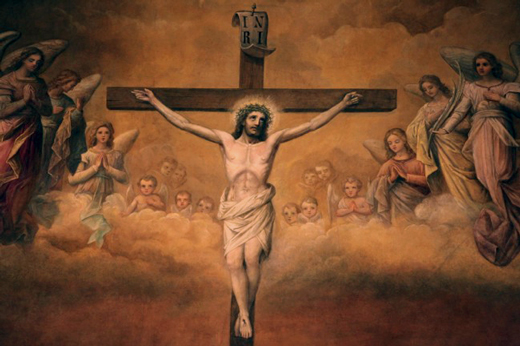
Hymn for Vespers in Lent
(“Audi benigne conditor”)
Thou loving Maker of mankind,
Before Thy throne we pray and weep!
Oh, strengthen us with grace divine
Duly this sacred Lent to keep.
Searcher of hearts! Thou dost our ills
Discern, and all our weakness know;
Again to Thee with tears we turn,
Again to us Thy mercy show.
Much have we sinned; but we confess
Our guilt, and all our faults deplore:
Oh, for the praise of Thy great name
Our fainting souls to health restore!
And grant us, while by fasts we strive
This mortal body to control,
To fast from all the food of sin,
And so to purify the soul.
Hear us, O Trinity thrice blest!
Sole Unity! to Thee we cry:
Vouchsafe us from these fasts below
To reap immortal fruit on high. Amen.
Stabat Mater (13th century)
At the cross her station keeping,
Mary stood in sorrow weeping
When her Son was crucified.
While she waited in her anguish,
Seeing Christ in torment languish,
Bitter sorrow pierced her heart.
With what pain and desolation,
With what noble resignation,
Mary watched her dying Son.
Ever patient in her yearning
Though her tear-filled eyes were burning,
Mary gazed upon her Son.
Who, that sorrow contemplating,
On that passion meditating,
Would not share the Virgin’s grief?
Christ she saw, for our salvation,
Scourged with cruel acclamation,
Bruised and beaten by the rod.
Christ she saw with lifeblood failing,
All her anguish unavailing,
Saw Him breathe His very last.
Mary, fount of love’s devotion,
Let me share with true emotion
All the sorrow you endured.
Virgin, ever interceding,
Hear me in my fervent pleading:
Fire me with your love of Christ.
Mother, may this prayer be granted:
That Christ’s love may be implanted
In the depths of my poor soul.
At the cross, your sorrow sharing,
All your grief and torment bearing,
Let me stand and mourn with you.
Fairest maid of all creation,
Queen of hope and consolation,
Let me feel your grief sublime.
Virgin, in your love befriend me,
At the Judgment Day defend me.
Help me by your constant prayer.
Savior, when my life shall leave me,
Through your mother’s prayers receive me
With the fruits of victory.
Virgin of all virgins blest!
Listen to my fond request:
Let me share your grief divine.
Let me, to my latest breath,
In my body bear the death
Of your dying Son divine.
Wounded with His every wound,
Steep my soul till it has swooned
In His very Blood away.
Be to me, O Virgin, nigh,
Lest in flames I burn and die,
In His awe-full judgment day.
Savior, when my life shall leave me,
Through your mother’s prayers receive me
With the fruits of victory.
While my body here decays
May my soul your goodness praise,
Safe in heaven eternally. Amen.
This time of fasting has opened to us the gates of paradise. Let us accept it, praying and beseeching that on the day of resurrection we may be glorified in the Lord...– Divine Office of Lent
Books for Lent
Way of the Cross
© 2008 Carmelite Monastery


